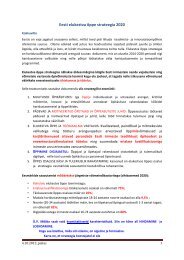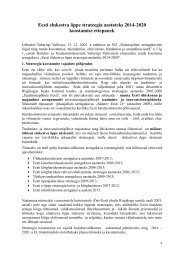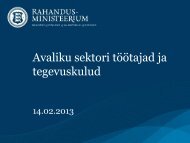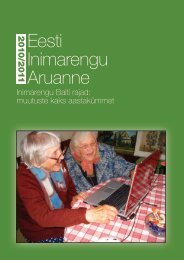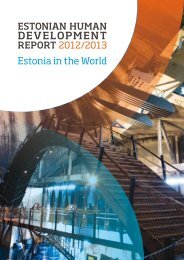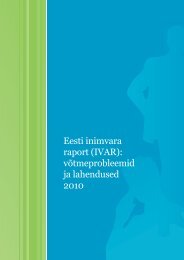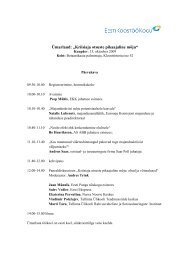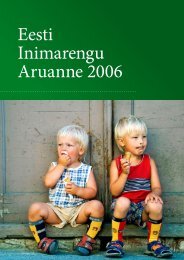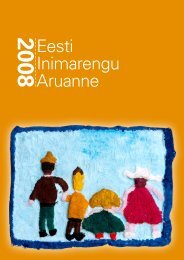Estonian Human Development Report
Estonian Human Development Report - Eesti Koostöö Kogu
Estonian Human Development Report - Eesti Koostöö Kogu
You also want an ePaper? Increase the reach of your titles
YUMPU automatically turns print PDFs into web optimized ePapers that Google loves.
Table 4.4.3. Agreement of the Russian-speaking<br />
population with the statements regarding political<br />
influence and competence<br />
Ethnicity Citizenship Age<br />
<strong>Estonian</strong><br />
Russian-<br />
Estoniasian<br />
Russpeaking<br />
Stateless<br />
15–2930–49 50–74<br />
Voting 85:11 72:23 83:13 74:19 60:36 74:22 69:27 70:20<br />
Belonging to a<br />
political party<br />
Participating<br />
in voluntary<br />
organizations<br />
28:64 26:63 28:64 26:61 27:66 29:64 24:63 27:59<br />
68:25 57:33 66:26 55:35 56:36 60:32 52:39 59:29<br />
Participating in<br />
24:63 31:54 25:62 34:50 33:55 30:59 30:54 30:50<br />
strikes<br />
Participating in<br />
collecting signatures/signing<br />
45:45 43:44 46:44 43:47 36:51 45:46 45:43 39:44<br />
petitions<br />
Participating<br />
in demonstrations/pickets<br />
All<br />
Citizenship<br />
<strong>Estonian</strong><br />
Russian<br />
Stateless<br />
Table 4.4.4. Assessment of the importance of various<br />
forms of participation by ethnicity, citizenship<br />
and age (Percentage of respondents who thought it<br />
important: percentage of respondents who thought<br />
it unimportant)<br />
27:60 34:53 29:59 38:51 30:57 35:55 31:54 34:49<br />
Participating<br />
in Internet<br />
forums and 19:66 25:53 21:63 19:47 25:56 29:61 27:56 17:39<br />
writing Internet<br />
commentaries<br />
Source: Integration of <strong>Estonian</strong> Society: Monitoring 2008<br />
Age<br />
15–29 30–49 50–74<br />
The course of events in the country depends on the choices of the people,<br />
including myself and people like me<br />
… (tend to) agree 25 33 19 11 35 27 14<br />
I think that I am sufficiently competent in political matters that my<br />
positions could be of interest to others<br />
… (tend to) agree 26 31 21 17 29 27 21<br />
Source: Integration of <strong>Estonian</strong> Society: Monitoring 2008<br />
tal organizations than Russian-speaking respondents. The<br />
latter, in turn, place somewhat greater importance on participating<br />
in strikes and pickets. Of <strong>Estonian</strong> citizens, 83%,<br />
of Russian citizens 74% and of stateless people, 60% think<br />
it is important to vote. There are no significant differences<br />
among groups of respondents with respect to the perceived<br />
importance of belonging to political parties. Young people,<br />
similarly to their parents’ and grandparents’ generations,<br />
References<br />
1. Dalton, R. (2004). Democratic Challenges, Democratic Choices:<br />
The Erosion of Political Support in Advanced Industrial Democracies.<br />
Oxford: Oxford University Press.<br />
2. Easton, D. (1965). A System Analysis of Political Life. New York:<br />
Wiley.<br />
3. <strong>Estonian</strong> <strong>Human</strong> <strong>Development</strong> <strong>Report</strong> (2007), Chapter 3.7. “The<br />
infosphere and media use of <strong>Estonian</strong> Russians” pp. 77–81.<br />
favour conventional means of influencing politics – voting,<br />
participation in the work of nongovernmental organizations<br />
and collecting signatures. Unlike the older generation,<br />
young and middle-aged people think the Internet is a<br />
relatively important arena of political participation.<br />
The above findings show that Russian-speakers feel that,<br />
compared to ethnic <strong>Estonian</strong>s, they have considerably fewer<br />
opportunities to be engaged in politics. Russian-speaking<br />
respondents who are <strong>Estonian</strong> citizens assess their political<br />
influence and competence more highly than people without<br />
<strong>Estonian</strong> citizenship. However, the lack of <strong>Estonian</strong> citizenship<br />
is not only a cause of political passivity but also a result<br />
of it: the fact that stateless people place less importance on<br />
voting suggests that they may have been less motivated to<br />
make efforts to secure the right to vote.<br />
Summary<br />
Several important aspects regarding the patterns of political<br />
support and participation in Estonia differ from those<br />
found in the “old” democracies. These include the lack<br />
of a shared definition of the political community, indecisive<br />
support for democracy as a form of government,<br />
weaker trust in the parliament and political parties and<br />
lower voter turnout compared to the EU average. We share<br />
many of these traits with other Eastern European countries.<br />
Throughout the transition period, however, the people<br />
of Estonia have given the performance of their political<br />
and economic systems considerably higher ratings than<br />
the inhabitants of Latvia and Lithuania.<br />
In both Estonia and Latvia, there is a clearly evident<br />
ethnic gap in public attitudes towards the state and its institutions.<br />
Despite progress achieved in naturalization, almost<br />
half of the Russian-speakers in Estonia (many of whom are<br />
<strong>Estonian</strong> citizens) do not consider themselves to be part of<br />
the <strong>Estonian</strong> nation in the constitutional meaning of the<br />
term. Only a quarter of Estonia’s Russian-speakers trust<br />
the <strong>Estonian</strong> state and slightly more than a tenth trust its<br />
principal political institutions – the Riigikogu, the government<br />
and the president. The results of a survey study carried<br />
out in spring 2008 show that the crisis of trust that<br />
accompanied the “bronze events” turned out to be deeper<br />
and longer lasting than expected. Neither European values<br />
nor security considerations allow us to disregard a crisis of<br />
trust of such proportions. The somewhat greater support for<br />
political institutions, greater identification with the <strong>Estonian</strong><br />
people and higher assessment of their political influence<br />
and competence among young Russian-speakers offer<br />
some hope that ethnic differences in political attitudes may<br />
decrease over time. However, the current gap between the<br />
political assessments of the ethnic majority and the minorities<br />
is so large that we cannot rely on the slow process of a<br />
generational change to reduce it.<br />
4. <strong>Estonian</strong> <strong>Human</strong> <strong>Development</strong> <strong>Report</strong> (2007), Chapter 2.2.<br />
“Civil initiative and voluntary organizing”, pp. 32–39.<br />
5. Ehin, P. (2007). “Political Support in the Baltic States, 1993–<br />
2004” Journal of Baltic Studies 38 (1), 1–20.<br />
6. European Commission (2008), Eurobarometer 69: Public Opinion<br />
in the European Union, http://ec.europa.eu/public_opinion/index_en.htm<br />
(1.10.2008)<br />
| 94



